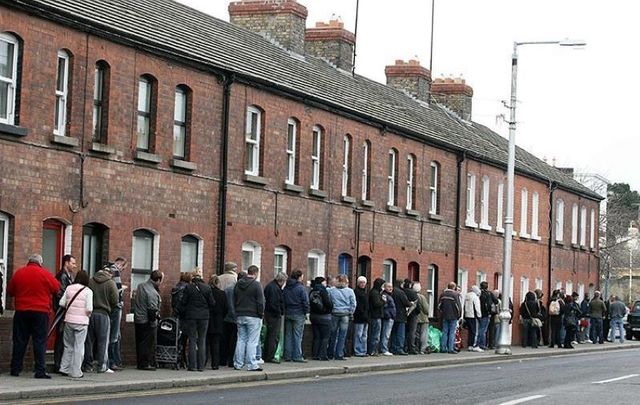“Covid-19 is the single largest challenge to the Irish economy since the financial crisis.”
Ireland's domestic economy could contract by 7 percent and unemployment could reach 18 percent in the scenario of a 12-week pandemic shutdown, according to a team of economic experts.
Read More: Coronavirus live updates: 3 more deaths, 32 new cases in Northern Ireland
The Economic and Social Research Institute (ESRI) in Ireland has published its quarterly report, which was edited by Research Professor Kieran McQuinn and Senior Research Officer Conor O’Toole. Contributors Matthew Allen-Coghlan and Cathal Coffey are Research Assistants at the ESRI.
In their report, the team says: “COVID-19 poses the single largest challenge to the Irish economy since the financial crisis.”
Noting the “unprecedented uncertainty” surrounding the current pandemic, the team conducted a “scenario analysis as opposed to a traditional forecast.” The team added: “Given the uncertainty around the duration of the virus it is not possible to produce accurate forecasts at a time like this.”
Working under the scenario that the pandemic lasts for 12 weeks in Ireland, the team of researchers predicts that “the domestic economy contracts by over 7 percent in 2020."
Additionally, “the unemployment rate is set to increase significantly with the rate increasing from 4.8 percent in February to 18 percent in Q2 2020 before falling back to just under 11 percent by the end of the year.”
“The likely increase in Irish unemployment will be substantial in size and rapid in nature. To provide some perspective, at the height of the financial crisis Irish unemployment went from 5.3 percent in February 2008 to almost 14 percent in September 2009. This time around, the unemployment rate could increase to 18 percent in Q2 of this year from its rate in February of 4.8 percent. If economic activity does begin to return to normal in Q3 and Q4, the unemployment rate declines through the rest of the year from 16.5 percent in Q3 to 10.7 percent in Q4”
They caution, however, that if the pandemic lasts longer than the 12-week scenario, it will have an even worse impact.
Regarding policy, the team says: “While the most pressing policy concern at present is to introduce whatever measures are required to stem the spread of the virus, policies to stabilise the economic fallout are also critical from an economic and human perspective.
"The overarching policy concern should be twofold: protecting household incomes and ensuring businesses can survive the pandemic period and remain viable in the aftermath.”
Read More: Ireland extends, implements new COVID-19 shutdown measures through April 19
On March 24, Ireland’s Department of Employment Affairs and Social Protection (DEASP) raised its COVID-19 Pandemic Unemployment Payment from €203 to €350 weekly.
You can apply for the new COVID-19 Pandemic Unemployment Payment if you:
- are aged between 18 and 66 years old and
- live in the Republic of Ireland and
- have lost your job due to the COVID-19 pandemic or
- if you are self-employed and have ceased trading due to the pandemic
If you are an employee and have:
- lost your job
- been temporarily laid off
- asked to stay at home
- not getting any money from an employer
The payment also applies to:
- non EU/EEA workers who have lost employment due to the COVID-19 (Coronavirus) pandemic
- students (and non-EU/EEA students) who have lost employment due to the COVID-19 (Coronavirus) pandemic
- part-time workers
The DEASP has also provided a scheme for employers: "If you are an employer who can show that you have lost at least 25 percent of your trade - you will be able to claim 70 percent of your employees net wage back (up to a maximum of €410) through the Temporary COVID-19 Wage Subsidy Scheme."
Read More: Taoiseach announces coronavirus shutdowns across Ireland beginning today




Comments